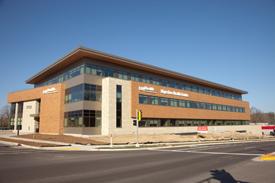
Preventing Endoscopy-Related Injuries Among Gastroenterology Fellows: A Train the Trainers Program
Practice Gaps and Needs
Overuse injuries have long been recognized to be a common problem among gastroenterologists. Current data suggests that 29% to 89% of endoscopists have experienced an overuse injury during their career1. Many of those injured require some form of therapy including oral medications, corticosteroid injections, or surgery. Many also report taking time off from work to deal with their injury2. Procedure volume, hours spent per week performing endoscopic procedures, and number of years in practice have previously been identified as risk factors for developing an overuse injury among practicing gastroenterologists.
Despite the well-recognized risk of injury among practicing gastroenterologists, little data currently exist on the prevalence of overuse injuries among gastroenterology fellows in training. As the ACGME does not require any formal training in preventing overuse injuries during gastroenterology fellowship, any teaching provided is at the discretion of the individual program and/or individual faculty members. As endoscopic procedure volumes continue to increase across academic and private practices throughout the country and many practices are trying to increase the number of cases performed to maximize resources and meet patient demand3, it is imperative that we find ways to prevent injury and potential disability in endoscopists at all stages of their training and careers.
1Ridtitid W et al. Prevalence and risk factors for musculoskeletal injuries related to endoscopy. Clinical Endoscopy. 2015 Feb; 81(2):294-304.
2Keate, R.F., Dryden, G.W., Wang, K. et al, Occupational injuries to endoscopists: report from the ASGE Web Survey. ([abstract])Gastrointest Endosc. 2016; 63:AB111.
3Vijian S, Inadomi J, Hayward R, Hofer T, Fredrick A. Projections of demand and capacity for colonoscopy related to increasing rates of colorectal cancer screening in the United States. Aliment Pharmacol The 2014;20:507-515.
Intended Audience
This activity is designed for University of Wisconsin School of Medicine and Public Health, Department of Medicine, Division of Gastroenterology and Hepatology Faculty and Fellows.
Learning Objectives
At the conclusion of the educational activity, the learner will be able to:
Define the rates and common injuries sustained by fellows during endoscopic training
Examine how to teach basic ergonomic principles to fellows during endoscopic training
Recognize the early signs of overuse injuries and prevention strategies
Elements of Competence
This CE activity has been designed to improve learner competence and focuses on the American Board of Medical Specialties’ areas of patient care and procedural skills.
Acknowledgement
This activity is supported by a grant from the Department of Medicine entitled, Medical Education Innovation Grant Academic Year 2017-2018.
AGENDA
Saturday, April 21
8:00 | Review of Overuse Injuries in Fellowship |
8:30 | SEIPS Model and Work Place Ergonomics |
9:00 | Biomechanics of Endoscopy |
10:00 | BREAK |
10:10 | Modifications to Prevent Common Injuries from Endoscopy |
10:40 | BREAKOUT Groups |
11:10 | LUNCH and Demonstrations (non-CME) |
11:40 | Closing Remarks (non-CME) |
12:00 | ADJOURN |
Course Directors
*Sumona Saha, MD
Associate Professor (CHS)
Division of Gastroenterology and Hepatology
University of Wisconsin School of Medicine and Public Health
*Kerstin (Kerri) Austin, MD
Gastroenterology and Hepatology Fellow
Division of Gastroenterology and Hepatology
University of Wisconsin School of Medicine and Public Health
Faculty
Melissa Burckardt, BS/MS OT, OTR/L
Hand and Upper Extremity Rehabilitation
Department of Orthopedics and Rehabilitation
UW Health
Mary Sesto, PhD, PT
Associate Professor
Division of Hematology and Medical Oncology
University of Wisconsin School of Medicine and Public Health
Amandeep Shergill, MD
Associate Professor of Gastroenterology
University of California San Francisco (UCSF)
Planning Committee
Terese Bailey
Senior Outreach Specialist
University of Wisconsin–Madison ICEP
Eric Gaumnitz, MD
Professor (CHS)
Division of Gastroenterology and Hepatology
Danielle Hepting
Fellowship Coordinator
Division of Gastroenterology and Hepatology
Michael Lucey, MD
Professor and Chief
Division of Gastroenterology and Hepatology
*=Planning Committee Member
Policy on Disclosure
It is the policy of the University of Wisconsin–Madison ICEP, that the faculty, authors, planners, and other persons who may influence content of this CE activity disclose all relevant financial relationships with commercial interests in order to allow CE staff to identify and resolve any potential conflicts of interest. Faculty must also disclose any planned discussion of unlabeled/unapproved uses of drugs or devices during their presentation(s).
Detailed disclosures will be made available prior to the start of the activity.
 | In support of improving patient care, the University of Wisconsin–Madison ICEP is jointly accredited by the Accreditation Council for Continuing Medical Education (ACCME), the Accreditation Council for Pharmacy Education (ACPE), and the American Nurses Credentialing Center (ANCC) to provide continuing education for the healthcare team. |
Credit Designation Statements
American Medical Association (AMA)
The University of Wisconsin–Madison ICEP designates this live activity for a maximum of 3.0 AMA PRA Category 1 Credits™. Physicians should claim only the credit commensurate with the extent of their participation in the activity.
Continuing Education Units (CEUs)
The University of Wisconsin–Madison ICEP, as a member of the University Professional & Continuing Education Association (UPCEA), authorizes this program for .30 continuing education units (CEUs) or 3.0 hours.
Available Credit
- 3.00 AMA PRA Category 1 Credit™
- 3.00 University of Wisconsin–Madison Continuing Education Hours
QUESTIONS ABOUT REGISTRATION
Email [email protected] or call 608-262-7226
PROGRAM CHANGES
Emergency situations occasionally occur and may necessitate topic or speaker changes. The University of Wisconsin School of Medicine and Public Health and the University of Wisconsin–Madison ICEP reserve the right to alter or substitute a topic or speaker without prior notification.
FOR FURTHER INFORMATION
For conference information, please contact Kerri Austin at 608-354-8382.
The University of Wisconsin provides equal opportunities in employment and programming, including Title IX requirements. The University of Wisconsin School of Medicine and Public Health fully complies with the legal requirements of the ADA and the rules and regulations thereof. If any participant in this educational activity is in need of accommodations, please notify Danielle Hepting in order to receive service. Please call 608-263-4034.

 Facebook
Facebook X
X LinkedIn
LinkedIn Forward
Forward